The Economic and Financial Crimes Commission (EFCC) has trained journalists and civil society organisations (CSOs) in Borno State on cryptocurrency-related fraud and other emerging financial crimes.
Declaring the workshop open in Maiduguri, the EFCC Zonal Director, CE Aisha Habib, said the training was part of the Commission’s efforts to enhance community engagement and promote public awareness on the risks associated with digital financial transactions.
“This workshop is a crucial step towards sharing insights, best practices, and strategies for mitigating the risks associated with cryptocurrency,” she said. “In today’s digital era, opportunities for growth come with significant challenges. We must stay ahead of the curve by equipping ourselves with the knowledge and tools needed to combat financial crimes.”
Habib noted that under the leadership of EFCC Chairman, Mr. Ola Olukoyede, the Commission was intensifying efforts to curb emerging threats in the financial sector.
She added: “As financial transactions evolve rapidly, innovation brings new risks. Understanding these risks is vital in protecting our economy and citizens. Let us use this platform to learn, collaborate, and strengthen our collective resolve against financial crimes.”
Speaking to journalists after the event, Habib emphasized the importance of involving the media and CSOs in the fight against financial fraud.
“We need community engagement. The media and CSOs are the mirror of society, and you have access to the people. Cryptocurrency, whether legitimate or illegitimate is a global issue. Many people don’t understand the advantages and disadvantages of crypto trading. That is why we are here to create awareness,” she said.
The Zonal Director warned the public against unrealistic profit claims often used by fraudsters.
“There is nothing like 200 percent profit. No one invests ₦100 and earns ₦200 instantly. People must be aware, crypto-related fraud is real,” she cautioned.
Habib explained that since assuming office, the EFCC Chairman has prioritised public engagement as a key component of the anti-corruption strategy.
“Any company registered with the CAC must also comply with EFCC regulations through our anti-money laundering department. We are putting in more effort. We have secured over 4,000 convictions this year alone. But the fight is ongoing, and we cannot win it without public support.”
She noted that delays in high-profile cases are often due to cross-border complications and the need for thorough investigations.
Also speaking, the EFCC Head of Media and Communication, Mr. Dele Oyewale, said the workshop aligned with the Chairman’s vision of encouraging Nigerians to take ownership of the fight against corruption.
“We want the people to own this fight. Cryptocurrency fraud and other crimes are tearing our nation apart. The EFCC, media, and CSOs must join hands to combat corruption. Media organisations have platforms, CSOs have platforms, together we can galvanise national effort,” he said.
Oyewale added that contrary to misconceptions, the EFCC is not focused solely on “yahoo boys,” noting that the Commission arraigned five governors and five ministers in 2024.
He called on all Nigerians to support the Commission, stressing that “the fight against corruption is a collective responsibility.”
















